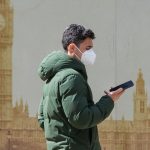Plans to abandon the law on self-isolation will cause a “fresh wave of anxiety” around COVID and the workplace, an employment expert has told Sky News.
Boris Johnson announced on Wednesday that “provided the current encouraging trends in the data” continue, people in England will no longer be legally obliged to isolate for five days if they test positive for the virus from the end of February.
COVID laws are a devolved matter so will be dealt with differently in Scotland, Wales and Northern Ireland.
While some have praised the move “back to normality”, others have major concerns restrictions are being lifted too quickly and, in the absence of isolation, coronavirus cases will rise again.
Freedom Convoy protesters head for Ottawa airport; live COVID updates
Gill McAteer, director of employment law at Citation, said: “In my experience, people have been quite happy to go back to work, but only on the basis that measures were being taken to keep COVID out of the workplace.
“This will throw everything into a new light and cause a fresh wave of anxiety that businesses can’t guarantee they can keep COVID out of the workplace.”
COVID-19: Wales’ First Minister Mark Drakeford tests positive for coronavirus
Boris Johnson: Nadhim Zahawi swerves question on whether he would support PM if he was fined over the ongoing partygate scandal
AstraZeneca sees COVID-related sales falling sharply but lift from other drugs ahead
Here Sky News looks at what employees rights are when the rules change, as well as what plans business owners, industry leaders and unions have for tackling the next phase of the pandemic.
What will businesses do when the rules change?
The prime minister said this week that as soon as MPs return after their recess on 21 February he wants to “present our strategy for living with COVID”.
This could mean publishing guidance for businesses on how to manage COVID in the workplace when employees are no longer required to stay at home by law. But currently, no such guidance exists.
“What the government is doing here is removing the legal obligation and pushing the responsibility on to employers instead,” Ms McAteer tells Sky News.
Please use Chrome browser for a more accessible video player
“They’re saying that businesses are going to have to make their own decisions.”
Firms will have to do their own risk assessments, she says, and draw up their own policies on staff who test positive for the virus.
Currently, because self-isolating when you have COVID is a legal requirement, people who cannot feasibly work from home – because they are too ill or their job prevents them from doing so – are entitled to statutory sick pay.
But when that legal requirement disappears, it will be up to businesses whether they want to pay staff to continue isolating or ask them to come in.
“When self-isolation ends, businesses will be torn between looking at things from a health and safety perspective and a cost perspective,” Ms McAteer says.
Will I have to come to work if I have COVID?
The government has said there will be “guidance” for employers on what to do if an employee tests positive for COVID-19.
This has not been published yet, but the prime minister’s official spokesman said: “Obviously in the same way that someone with flu, we wouldn’t recommend they go to work, we would never recommend anyone goes to work when they have an infectious disease.”
Please use Chrome browser for a more accessible video player
This means businesses could continue following the current rules of five days’ isolation, but they would have to pay staff to be off work.
Alternatively they could ask the person to do daily lateral flow tests (LFTs) and only return when they test negative, even if that is sooner than five days.
But there will be no legal obligation to stay at home, so business owners could expect people to come in – even with the virus.
Can I still work from home?
From 19 January in England government guidance to work from home “if you can” was dropped.
But with people soon being allowed to leave their homes even if they have COVID, scientists fear infections will rise again.
This could make people more anxious about returning to work.
Union GMB’s health and safety officer Dan Shears described the government’s plans as “premature” and said: “There are still 60,000 plus new COVID cases every day.
Read more: Removing self-isolation this month ‘goes against principles of public health’
“Though for many Omicron has been less severe than previous variants, thousands of people are being seriously affected every week and many have yet to be fully vaccinated.”
Several workplaces have already introduced hybrid working policies – allowing people who can do their jobs from home to work remotely on some days and in the office on others.
But if someone wants to continue working from home but their employers don’t want them to they can file a flexible working request.
Anyone who has served at least 26 weeks in their job is legally entitled to ask for flexible working, with employers obliged to “deal with requests in a reasonable manner”.
If the employee isn’t satisfied with the outcome, they can take the matter to an employment tribunal.
What can I do if I don’t want to go back?
If an employee’s contract says their job requires them to come to work, they are legally obliged to do so.
But if they don’t feel comfortable because of COVID they could file a health and safety claim under the Employment Rights Act.
Ms McAteer explains: “A health and safety claim is a form of legal protection that stops employees being mistreated or dismissed.
“It can be made if an employee feels there is a serious or imminent danger to themselves or others in them coming to work.”
Listen and subscribe to The Ian King Business Podcast here
The “serious or imminent danger” could be because the employee themselves, one of their colleagues, or someone in their household is clinically vulnerable to COVID or cannot get vaccinated.
But it could simply be due to anxiety about the virus, Ms McAteer adds.
“It only requires the employee to genuinely believe there to be a risk, they don’t have to prove there is one – and employers often get that wrong,” she says.
“As a result, we’ve seen these types of claims sky-rocket during the pandemic.”
Casual and freelance workers have now been included in these health and safety protections in light of COVID.
What are businesses doing?
Family Law Group, East Midlands
Simon Leach is the director of Family Law Group, a firm that has around 130 employees across 10 offices from Milton Keynes to Chesterfield.
He said his main priority when the changes come in is that his employees feel comfortable being at work.
“Our policy is about making sure that our staff feel psychologically safe,” he told Sky News.
On self-isolation, he said he plans to continue using the current five-day rule.
“We are going to carry on with our existing policy, as we think staff are still quite anxious about coming into the office if they or others have COVID,” he said.
Although it has a flexible working policy, the majority of Family Law Group staff have been back in the office since June 2021.
“Because the nature of family law is distressed work, which requires a lot of emotional support, we need to make sure we can support one another in the office,” Mr Leach said.
“So our default position is that people are in the office.”
Although the rules on masks have been relaxed, social distancing and a “strict hygiene policy” will remain in place so staff feel comfortable, he added.
Bright HR, Manchester
Alan Price is the chief executive of Bright HR, a human resources consultancy with 248 staff in its Manchester office. It also forms part of the Peninsula Group, which has 1,000 employees across the UK and 2,000 globally.
Bright HR has a hybrid working policy already, which will continue for staff who can work remotely.
Mr Price told Sky News that for the first month after the law changes, self-isolation rules will remain the same.
All employees will be able to work from home or receive full pay for the days they are isolating.
But this will be kept under “monthly review” and may be reduced to just those who are clinically vulnerable or live with someone who is.
In two or three-months’ time he says staff who have COVID but are asymptomatic would be expected to come in.
“Our workplace is very safe, it’s well ventilated and there’s plenty of space for our staff.
“We’ve never removed our COVID-secure measures so there are very few people who are still worried.”
On long-term homeworking for staff needed in-person, he said he would “look at the facts” and consider how COVID may have affected that employee during the pandemic.
They would also be referred to an in-house counselling service to help reassure them about the virus at work.
“But if we deemed it unreasonable that they stay at home, we would require them to come in,” Mr Price said.
What are unions and trade associations saying?
Unions say they want companies to make sure staff feel safe by continuing to enforce COVID protocols.
A GMB spokesman said: “GMB is organising to ensure that employers continue to provide protective measures until case numbers are much lower.
“Workers should not lose pay or be disciplined for falling ill through no fault of their own.
“We will continue to challenge the bad employers who try to make their employees pay the costs of COVID.”
A Confederation of British Industry (CBI) spokesperson said they too are calling for more protective measures, including access to LFT tests and vaccines, to “maintain confidence” among employees.
The British Chamber of Commerce (BCC) urged the government to publish its new guidance as soon as possible.
Director general Shevaun Haviland said: “Businesses will welcome the removal of the self-isolation requirement if there is crystal clear guidance on what this means for firms and their legal responsibilities to employees and customers.
“Without clear guidance, there is a real risk that this move could increase conflict and confusion in the workplace.”






















